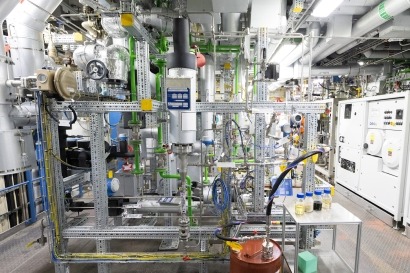
Initially, large quantities of bio-based aniline will be produced there, so that the new technology can be further developed for production and transferred to an industrial scale. In the plastics industry, aniline is used to produce MDI, among other things. This in turn is used for insulating foam, for example, which saves energy in buildings and reduces the CO2 footprint.
In attendance at the opening ceremony were North-Rhine Westphalia’s Deputy Minister President Mona Neubaur as well as Professor Walter Leitner, Managing Director of the Max Planck Institute for Chemical Energy Conversion in Mülheim an der Ruhr. Together with Dr. Thorsten Dreier, Chief Technology Officer of Covestro, they discussed the significance of bio-based raw materials for a sustainable chemicals industry of the future.
“Among other things, aniline is a key raw material for foams used to insulate buildings and refrigerators,” explained Dreier, on the significance of the base chemical. “Until now, aniline has been produced from fossil raw materials such as petroleum, which releases CO2 and fuels climate change ... I am very proud that we have now succeeded in making the jump to the next technological level.”
Covestro developed the process, which has already won several awards, together with partners in the scientific community. Compared to conventional technology, the process leads to a greatly improved CO2 footprint of aniline. Covestro has made a seven-digit investment in the pilot plant at the Chempark Leverkusen.
"Sustainable innovations from North Rhine-Westphalia are making a decisive contribution to the transformation of Germany as a chemical location. The world's first pilot plant for bio-based aniline is an impressive example of this," emphasized Neubaur, who is also the State Minister for Economic Affairs, Industry, Climate Protection and Energy.
Professor Leitner also underlined the importance of partnerships. “The project illustrates the cooperation between research-based industry and application-oriented science. There are many intersecting partnerships like these, especially in NRW. Germany needs more of this in order to assert itself as a research and technology location.”
The project also clearly showcases the potential contribution of the industrial (“white”) biotechnology to plastics production: in the new process, a customized microorganism helps convert an industrial sugar extracted from plants into an intermediate product through fermentation. This takes place under milder and thus more environmentally compatible conditions than in conventional processes. In a second step, chemical catalysis of the intermediate product then creates the aniline with one hundred percent plant-based carbon.
The research on bio-based aniline will also continue to be funded by the German government. The German Ministry for Food and Agriculture is funding a follow-up project (Bio4PURDemo) from Covestro and partners, which started in March 2022 and runs until 2025.
The RWTH Aachen with the CAT Catalytic Center and the University of Stuttgart, as well as the technology transfer initiative located there, are also participating in the project.

